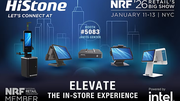Customer Service
5 seasonal hiring tips for 2021 based on 2020 lessons
Jane Sloan, manager, customer success at CareerBuilder, explains why when it comes to seasonal hiring strategies retailers should plan for resilience. The speed of economic recovery depends on how quickly companies can find the right talent at the right time.

February 11, 2021 by Jane Sloan
Hiring for seasonal positions has always required recruiters to act swiftly and with certainty to fill in-demand roles. However, sudden reversals in municipal re-openings, quick-turn curfews and other ever-changing regulations cause starts and stops for retailers' operational planning. Meanwhile, candidates are still leery about returning to a physical workplace in the new year, and businesses await additional stimulus support and grapple with attracting candidates.
The shifting landscape comes with challenges, but with more candidates in the market, it also presents opportunities for retailers to build their seasonal talent pipelines for greater resilience. Here are a few key pointers and emerging trends that retail companies can take from the most unpredictable year ever to strengthen their workforce in 2021.
1) Prepare to flex with next year's "normal"
The past year ushered in a host of changes in consumer behavior from an uptick in online shopping to stockpiling. Among those shifts, and importantly for retailers with seasonal sprees, consumers engaged in smaller but more frequent celebrations to find comfort and joy in locked-down living. Retailers should expect smaller summer barbeques that look more like they did in 2020 than in 2019. To stay connected to loved ones, consumers may emphasize gifting on Mother's Day, Father's Day and birthdays. And, with e-learning and rapid changes in schools' planning, "back to school" isn't strictly in August anymore. Overall, retailers might notice a leveling of dramatic spikes replaced by more moderate but consistent demand.
Retailers can respond by building their capacity to quickly build up their workforce in the areas they need it most — e-commerce and delivery. Heavy and tractor-trailer truck drivers and light trucking and delivery drivers have remained among the top posted positions. With growing coronavirus cases across the country, the shift to online will continue well into the new year.
2) Search for skills when reading resumes
Tens of millions of Americans were laid off due to pandemic closures and as a result of an environment in which some industries have fared better than others. Job seekers have been adapting and match the shift in the employment landscape, with nearly 84% of survey respondents indicating they would be willing to take a job outside their current or most recent industry or role; 61% reported having reconsidered their current industry or role. When retailers are looking to fill seasonal roles, they should keep an open mind to candidates who are coming from industries that were severely impacted by the pandemic. Even if these candidates don't have retail experience, they still might be a good fit for your company.
Retailers can find top talent by focusing on transferrable skills in resumes. For example, a candidate might not have any experience in retail but loads of experience in restaurants and hospitality. These candidates have the potential to bring important skills that nicely transition into a retail role, such as customer service and communication, time management and multi-tasking, and detailed attention to sanitation guidelines. By focusing on skills instead of job history alone, companies can widen their talent pool to find qualified candidates while cultivating a broader and more diverse candidate base. Managers might even be surprised by the creativity and problem-solving skills that candidates from other industries will bring to the role.
3) Use all tools available to showcase your company's safety culture
Retail associates have been among the essential workers showing up to the workplace despite their stress and fatigue — and they have the added burden of interfacing with concerned and sometimes highly frustrated customers. Through 2021, it will continue to be critical for retailers to lead with what they are doing to protect these frontline associates.
Virtual hiring fairs are becoming an increasingly popular venue for companies to share information about how they have responded to the crisis. Maintaining an active culture-centric social media feed, too, is a natural and accessible way for job seekers to read authentic testimonials from employees themselves. Retailers' HR functions may encourage employees to post pictures of their socially distanced workstations or to include a company hashtag in their photos of participating in a company-led volunteer effort. Job seekers will value your employees' perspectives on social media over an ad — it's all about reaching them where they are.
4) Working with a staffing agency? Learn more about their tech investments
For temporary hires, staffing agencies can offer capacity and flexibility. At CareerBuilder, we partnered with ClearlyRated to conduct a staffing industry study to shed light on the impact that COVID-19 has had on the industry and found that, like everyone, staffing firms have had to shift the way they do business in response to the pandemic recession. The data shows that 86% of staffing firms reported making significant changes. These changes are then translating into an investment into technology, specifically automation.
This increased focus on automation relieves the burden of manual entry and speeds up onboarding, making the hiring process move faster for retailers. When retailers are considering working with a staffing firm, or evaluating their current one, they should open up the conversation around how the firm uses new technology to respond to the need for more flexible workforces. After all, these agencies are there to help.
5) Always be building relationships — and cultivating your talent pipeline
Keep last cycle's hires top of mind for what's next. This piece of advice hasn't changed from years past, but now, recruiters should be especially diligent about maintaining relationships with qualified candidates who would make a good hire when the economy rebuilds.
One way to make a great impression on candidates is by making the acquisition and on-boarding process as smooth as possible. Retailers should work to identify within their hiring processes where solid candidates are falling through the cracks or where they are being asked for the same information multiple times. A clunky acquisition process won't just hurt you now, you'll continue feel the crunch when it comes to ramping up your workforce later in the year.
We are still very much in the grips of this pandemic and cannot anticipate a definite return to normalcy. So rather than plan for normalcy, we should plan for resilience. The speed of economic recovery depends on how quickly companies can find the right talent at the right time. With the right tools and a keen focus on what matters — and what doesn't — in hiring, retail can position itself to embrace the opportunities that come with every season of the year ahead.
Jane Sloan is manager, customer success at CareerBuilder
 ChatGPT
ChatGPT Grok
Grok Perplexity
Perplexity Claude
Claude




